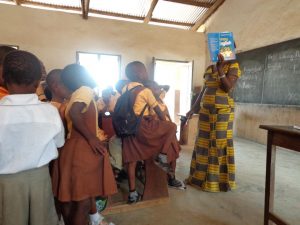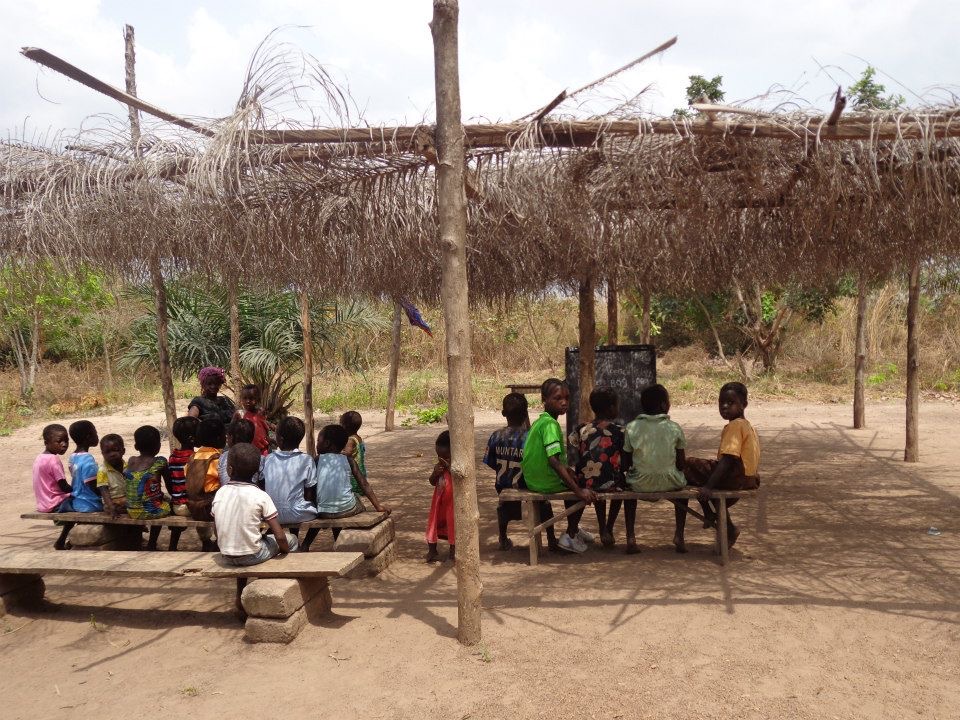Click on the pictures to get a better view and to scroll through easier. We also have more pictures on Facebook.
This year I traveled to Ghana for the second time, the last 2 weeks of my month was spent in Denu a small village outside of Aflo with the Atlantic Ocean in the backyard. A few days a week I observed at the local school. I met with the headmaster and he gave me free reign of whatever I wanted to do. Schools in Ghana love outsiders prospectives and will warmly welcome you to teach if you wish to and usually about any topic you want, but I decided to just observe rather than teach. Visiting the local school was hard for me this time and it brought out a lot of emotions in me that I wasn’t expecting.
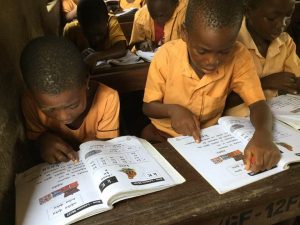 The classrooms are set up with small desks, many are broken and being shared among 3 students. The windows are completely open with a gentle breeze coming straight from the ocean. The younger children learn more about their local language first through games, stories, and play, as they get older there is a focus on English, reading, and writing. They also have the other basic subjects like science, social studies, and math. I observed almost all of the classrooms except the older children that would soon be graduating. This time it was much different. In this specific school, they still practice corporal punishment by striking the students using a thin branch, which they refer to as “caning”. I’m going to use the word whipped, not caned because that’s what it is, a whipping. The parents are aware of this and seem to understand that if their child was whipped that day then they probably did something to deserve it. I witnessed children being whipped to speed up their writing or for misbehaving. Usually, this was multiple times in the hand, arms or back. If the children didn’t remember what the previous days topic was about they all risk getting whipped, one by one. I saw this happen and I had to fight back the urge to grab the stick from the teacher. When you’re in a culture that’s different from your own there are certain things you can do and certain things you need to bite your tongue about. This is one of those things that I couldn’t do anything about. I should have walked out but I just froze and sat there in shock as I witnessed the teacher whip all 25 students.
The classrooms are set up with small desks, many are broken and being shared among 3 students. The windows are completely open with a gentle breeze coming straight from the ocean. The younger children learn more about their local language first through games, stories, and play, as they get older there is a focus on English, reading, and writing. They also have the other basic subjects like science, social studies, and math. I observed almost all of the classrooms except the older children that would soon be graduating. This time it was much different. In this specific school, they still practice corporal punishment by striking the students using a thin branch, which they refer to as “caning”. I’m going to use the word whipped, not caned because that’s what it is, a whipping. The parents are aware of this and seem to understand that if their child was whipped that day then they probably did something to deserve it. I witnessed children being whipped to speed up their writing or for misbehaving. Usually, this was multiple times in the hand, arms or back. If the children didn’t remember what the previous days topic was about they all risk getting whipped, one by one. I saw this happen and I had to fight back the urge to grab the stick from the teacher. When you’re in a culture that’s different from your own there are certain things you can do and certain things you need to bite your tongue about. This is one of those things that I couldn’t do anything about. I should have walked out but I just froze and sat there in shock as I witnessed the teacher whip all 25 students.
 One day while I was observing, all shoes were collected from rooms of the children that had taken their shoes off and were put into one pile in another classroom. Later I found out they had to go the whole day walking on the hot sand barefoot, this was their lesson in why they shouldn’t take their shoes off at school. Since the school is so close to the Ocean the entire school grounds are surrounded by sand so there is no escaping it and when the weather is almost 100 degrees the sand is hot like fire. Brooms that are used to sweep the classrooms at the end of the day were also collected and a man came in with a notebook announcing names. The children whose names were called went to the front board and he whipped them 4 times each in-front of everyone. I’m not sure why this happened but it was painful to watch. It was not a gentle whip, they were full force lashes like back in the slave days. I couldn’t help but think that the cycle is just continuing. The ones doing the whippings were once whipped themselves and the ones being whipped are likely to do it too if they become a teacher. Hopefully by that time caning will be a thing of the past.
One day while I was observing, all shoes were collected from rooms of the children that had taken their shoes off and were put into one pile in another classroom. Later I found out they had to go the whole day walking on the hot sand barefoot, this was their lesson in why they shouldn’t take their shoes off at school. Since the school is so close to the Ocean the entire school grounds are surrounded by sand so there is no escaping it and when the weather is almost 100 degrees the sand is hot like fire. Brooms that are used to sweep the classrooms at the end of the day were also collected and a man came in with a notebook announcing names. The children whose names were called went to the front board and he whipped them 4 times each in-front of everyone. I’m not sure why this happened but it was painful to watch. It was not a gentle whip, they were full force lashes like back in the slave days. I couldn’t help but think that the cycle is just continuing. The ones doing the whippings were once whipped themselves and the ones being whipped are likely to do it too if they become a teacher. Hopefully by that time caning will be a thing of the past.
It was one of the hardest things I’ve ever had to witness, the looks on the children’s faces were something I’ve never seen before. I locked eyes with one of them and it was as if he said please help me don’t just sit there, but I couldn’t do anything. The hardest part was seeing the teachers laugh after as if it were some type of comedy T.V. show. I began thinking about children in the U.S. and how lucky they have it. The worst that happens is getting expelled for a few days, which really isn’t a punishment. I spoke to a male teacher and asked him about the whippings. I told him how if that were to happen in America you’d go to jail and likely get sued by the child’s parents. He mentioned that they were asked to stop hitting the children but like anything it takes time to change the pattern that’s been going on for many years.
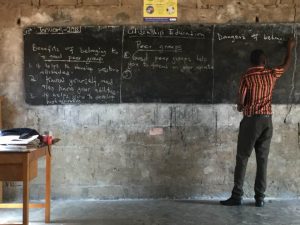 On a happier note, during one observation the male teacher was talking about the benefits of belonging to a good peer group versus dangers of a bad peer group. Some of the dangers he spoke of were the peer pressure of having sex before marriage, drug abuse, robbery, and prostitution. Although the children laughed a lot, many of the children in the class were anywhere between 9-15 and quite a few have already had sex. For them to stay on the right path it’s necessary to teach them these things because if they are on the streets they may easily get swept up with the wrong crowd. This was the only class I observed which didn’t result in any whipping so I was happy to see that not all of the teachers practiced the same punishment on a daily basis.
On a happier note, during one observation the male teacher was talking about the benefits of belonging to a good peer group versus dangers of a bad peer group. Some of the dangers he spoke of were the peer pressure of having sex before marriage, drug abuse, robbery, and prostitution. Although the children laughed a lot, many of the children in the class were anywhere between 9-15 and quite a few have already had sex. For them to stay on the right path it’s necessary to teach them these things because if they are on the streets they may easily get swept up with the wrong crowd. This was the only class I observed which didn’t result in any whipping so I was happy to see that not all of the teachers practiced the same punishment on a daily basis.
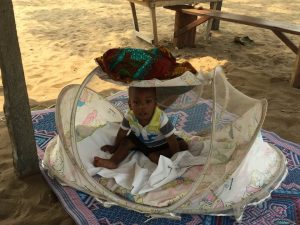 During break time the children step outside the classrooms and buy lunch from the women who are there daily to sell water, snacks, and food. They spend their break time eating, playing games and often kicking, punching and pushing each other around. Ghanaian kids love fighting each other and even if they are playing one of them always gets hurt.
During break time the children step outside the classrooms and buy lunch from the women who are there daily to sell water, snacks, and food. They spend their break time eating, playing games and often kicking, punching and pushing each other around. Ghanaian kids love fighting each other and even if they are playing one of them always gets hurt.
If the teachers have babies, the women that are outside selling the food often watch them throughout the school day as if they were their own. That’s one thing that I really admire about African women, they openly take care of children that aren’t theirs for the sake of being kind and doing the right thing. Even Cha Cha’s mom has children that have been living under her care for years, none of them she gave birth to.
My second time in Ghana observing was hard for me and I’ve put off writing this post for a while now. I didn’t want to re-live the experience through writing it. I hope that in the future when I visit Ghana again, corporal punishment will be non-existent and another form of discipline will take effect. Overall, it was a growing experience for me seeing the differences in both teaching and discipline styles compared to what I’m used to seeing in the U.S. It is a reminder that when mistreatment is happening toward anyone or anything, it’s important to stand up for what is right. 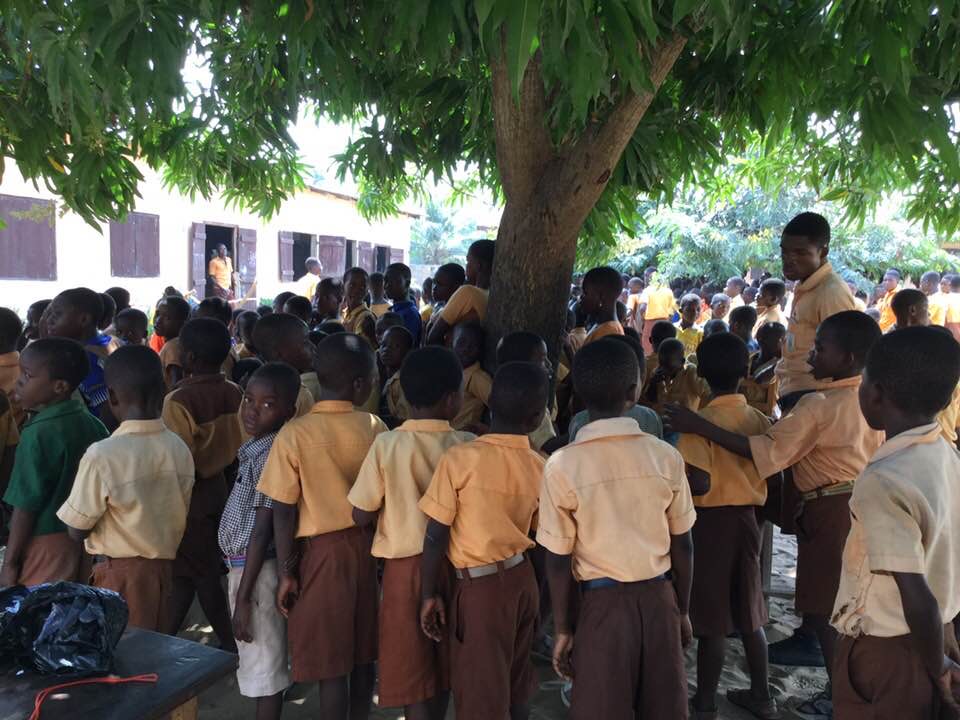

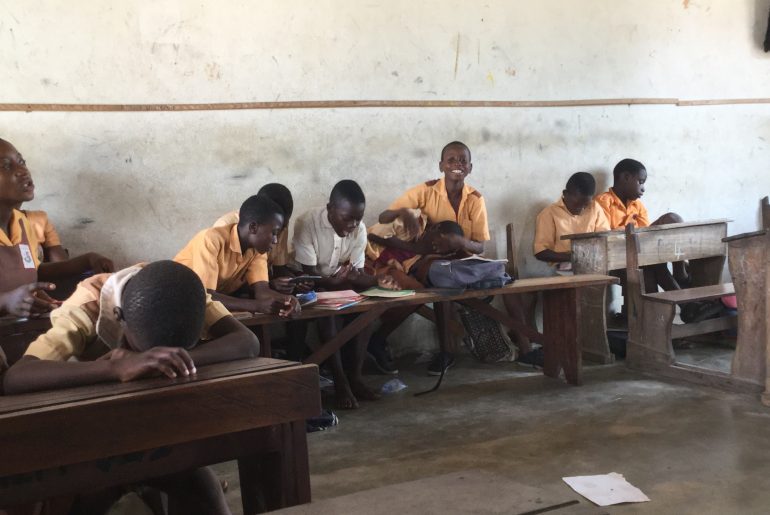
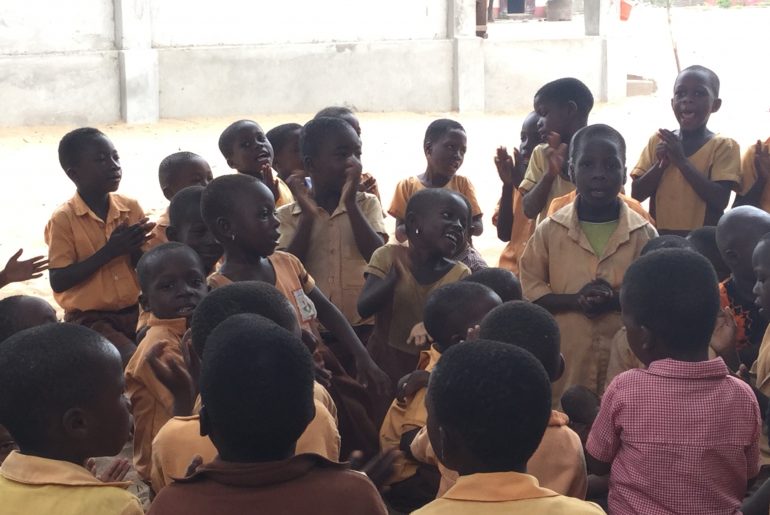
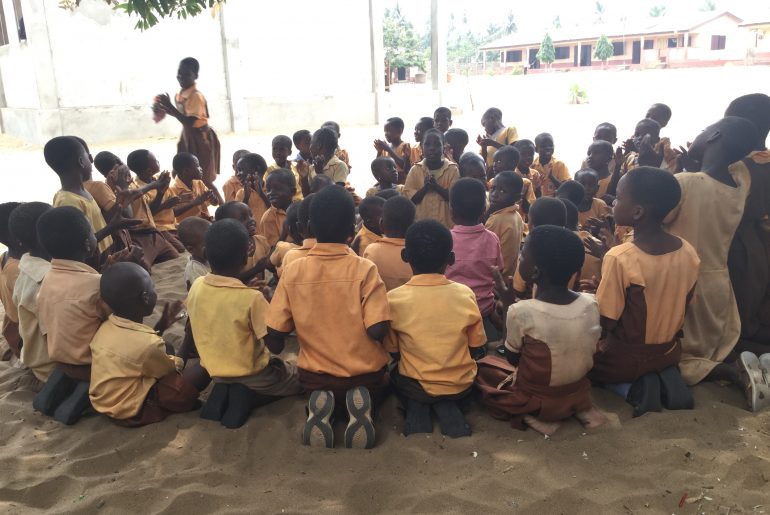
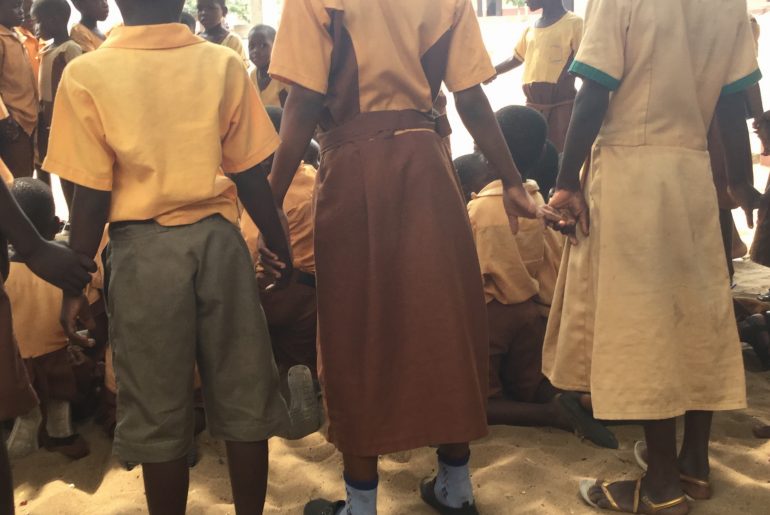
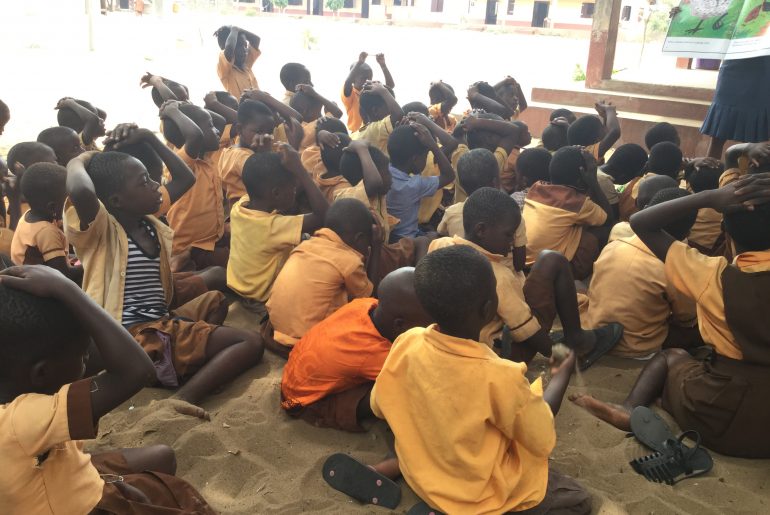
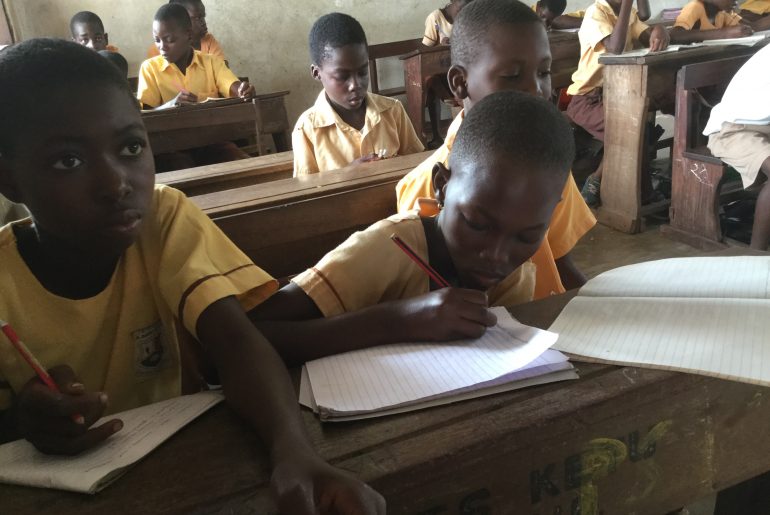
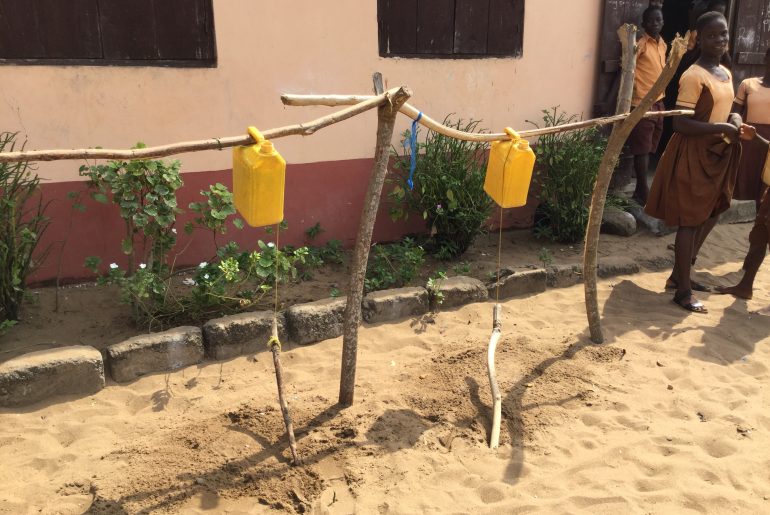
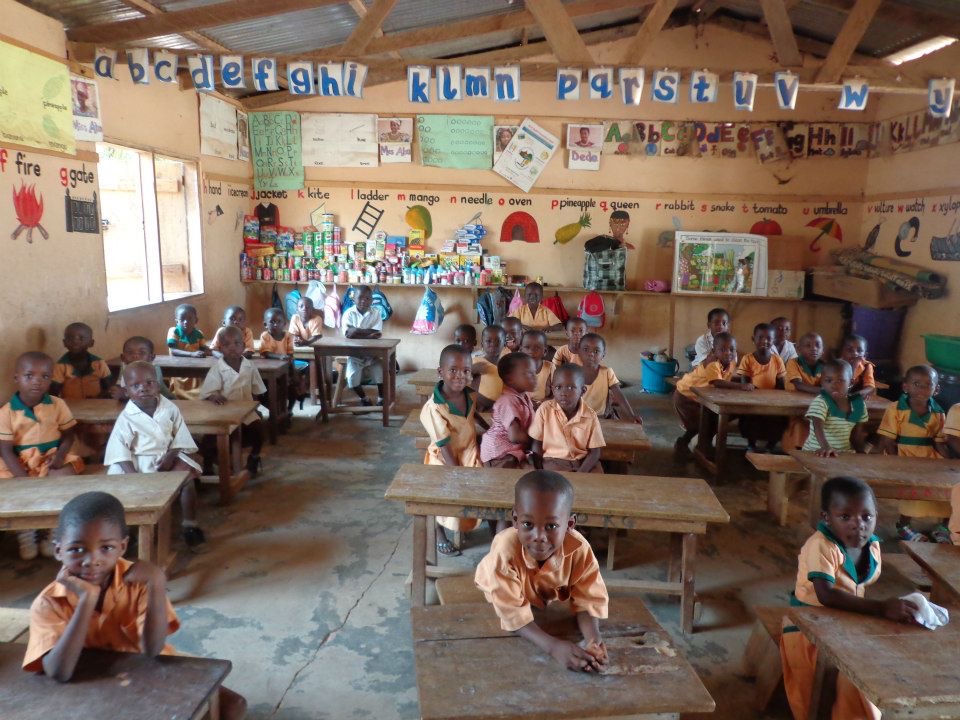
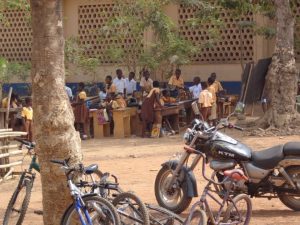 My first time observing was in Ghana back in 2013. In order for these children to have some type of success, education is key. Children need to be in school or they will be roaming the streets and getting into trouble. I observed at an elementary school right down the road from where I was staying. When I stepped onto school grounds a crowd of children ran up and surrounded me, touching my freckles while smiling and laughing. All of the children have to wear uniforms and are responsible for keeping track of and washing them. If they come to school without their uniform, they risk being sent home. Unless they go to a private school, their head needs to be shaved bald.
My first time observing was in Ghana back in 2013. In order for these children to have some type of success, education is key. Children need to be in school or they will be roaming the streets and getting into trouble. I observed at an elementary school right down the road from where I was staying. When I stepped onto school grounds a crowd of children ran up and surrounded me, touching my freckles while smiling and laughing. All of the children have to wear uniforms and are responsible for keeping track of and washing them. If they come to school without their uniform, they risk being sent home. Unless they go to a private school, their head needs to be shaved bald.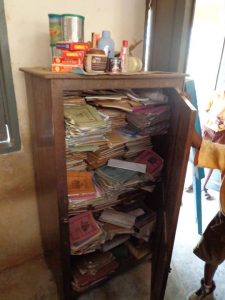 I didn’t observe too much during my time in Ghana so I don’t know the curriculum that is taught but I do know that teachers do their best with what they are given. In one of the classrooms, there was one laptop that the children used to practice their typing, with 5 or 6 children surrounding the desk waiting for their turn. Understanding how to use the computer is an important skill to know and although they don’t have a computer lab with multiple computers, they make use of the materials that they do have. I definitely didn’t expect to walk into a room with a laptop, so this was a shock to me. There were no materials to use, but somehow there was a laptop at the front of the class which didn’t make sense to me. Later I found out that it was one of the staffs and they shared it between multiple classes. Children getting the opportunity to use a computer is very slim unless they are a bit older and can afford to go to a local Internet cafe, so they were very eager to get the chance to type. Depending on the money your family has and the resources the school has, you may or may not have books. In one of the rooms, there was one teacher holding up a book for about 40 students to see. I think the teachers have a harder time keeping children engaged due to the lack of materials they have to work with. This is probably why many lessons incorporate movement and song, because it’s easy and doesn’t require money. Children are given a notebook to write their homework and notes in, likely to be something that they have to purchase on their own. In between lessons they are often put into crowded cabinets.
I didn’t observe too much during my time in Ghana so I don’t know the curriculum that is taught but I do know that teachers do their best with what they are given. In one of the classrooms, there was one laptop that the children used to practice their typing, with 5 or 6 children surrounding the desk waiting for their turn. Understanding how to use the computer is an important skill to know and although they don’t have a computer lab with multiple computers, they make use of the materials that they do have. I definitely didn’t expect to walk into a room with a laptop, so this was a shock to me. There were no materials to use, but somehow there was a laptop at the front of the class which didn’t make sense to me. Later I found out that it was one of the staffs and they shared it between multiple classes. Children getting the opportunity to use a computer is very slim unless they are a bit older and can afford to go to a local Internet cafe, so they were very eager to get the chance to type. Depending on the money your family has and the resources the school has, you may or may not have books. In one of the rooms, there was one teacher holding up a book for about 40 students to see. I think the teachers have a harder time keeping children engaged due to the lack of materials they have to work with. This is probably why many lessons incorporate movement and song, because it’s easy and doesn’t require money. Children are given a notebook to write their homework and notes in, likely to be something that they have to purchase on their own. In between lessons they are often put into crowded cabinets.